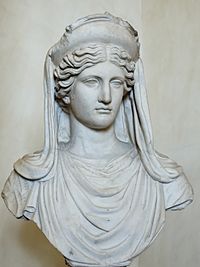Demeter 1108
 Demeter was the Greek goddess of agriculture and the harvest, fertility and motherhood, who presided over the natural cycle of birth and death. She and her daughter Persephone were the central figures in the Eleusinian Mysteries, an ancient sacred and secret philosophical cult which dominated the Mediterranean in the pre-Christian era.
Demeter was the Greek goddess of agriculture and the harvest, fertility and motherhood, who presided over the natural cycle of birth and death. She and her daughter Persephone were the central figures in the Eleusinian Mysteries, an ancient sacred and secret philosophical cult which dominated the Mediterranean in the pre-Christian era.
Demeter was the mother of Kore, later called Persephone, by her brother Zeus, king of the gods. The two were virtually inseparable, but one day as Kore wandered alone in the fields, she was seen by her uncle Hades, god of the underworld, who desired her youth and innocence. A great rift opened in the earth, Hades drove up from the underworld in his chariot, and carried off the struggling Kore, taking her to his domain, where she became his wife Persephone, Queen of the underworld.
Kore had simply disappeared; no one knew what had become of her, and the disconsolate Demeter searched the earth in vain. Preoccupied by her distress, Demeter neglected her duties; the world grew cold and barren, growth ceased, crops and animals began to die. But while no one had actually witnessed Kore’s abduction, Hekate had heard it from afar, and she relayed her knowledge of Kore’s whereabouts to Demeter, who appealed to Zeus for her daughter’s return.
Zeus, faced with the extinction of all life on earth, sent Hermes to the underworld to retrieve Persephone, but Hades refused to release her. Zeus ruled that she could return, provided she had eaten none of the food of the dead. Persephone had, indeed, refused all nourishment, but one day, as she walked in the gardens, had picked a pomegranate, opened it, and ate six seeds. This was witnessed by Hades’ gardener Askalaphus, who testified against her. Zeus ordered a compromise – Persephone could return to her mother in the spring, but every autumn would descend again to her husband Hades. In retaliation, Demeter removed her fecundity from the earth for the six months of Persephone’s absence, and thus the seasons came to be.
In medieval times, Demeter came to be associated with the pagan Triple Goddess, a three-in-one union of Kore the Maiden, Demeter the Mother, and Hekate the Crone. As such, she is still a central figure of Wicca and other modern nature religions.
Astrologically, Demeter represents motherhood, the parent-child bond, and fertility; agriculture and grain crops especially; nutrition, diet and food in general.
